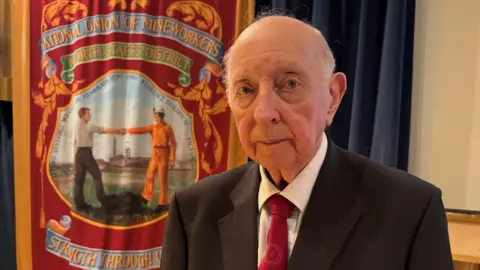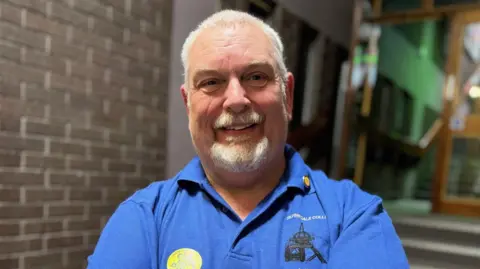Scargill joins miners' strike anniversary event
 BBC
BBCAn event has been held to commemorate the 40th anniversary of the miners' strike.
It is one of a series of events organised by the North Staffs Miners Wives Action Group (NSMWAG) to pay tribute to the women who ran food centres around the north Staffordshire coalfields.
Former union leader Arthur Scargill, who led protests against pit closures across the UK, attended the event at The Potteries Museum and Art Gallery in Hanley, Stoke-on-Trent, on Saturday.
He told the BBC it was as important for mining communities to come together today as it was at the time of the strikes.
'I owe them'
He said he felt a duty to ex-mine workers to attend rallies and talks, and has attended five similar anniversary events.
“I owe it to them,” he said. “They took part in it, I owe it to them.”
He added: “It’s a question of my age and my health, but apart from that wherever I can I’ll do my job on behalf of those who were so courageous."
Mr Scargill said he was a socialist, and a “committed militant” from the day he began working in the pits at the age of 15.
“I’m still the same, and will be the same until the day I die,” he said.
NSMWAG chair Rose Hunter said the group was still fighting for their communities and standing against all forms of oppression.
“Our aim in these events around the theme of 'No Going Back' is to inspire girls and women, workers, and community members to stand together strong in solidarity,” she said.
Other speakers at the event included Debbie Patton of NSMWAG, Ian Hodson of the Bakers, Food and Allied Workers Union, Kate Flannery from the group Orgreave Truth and Justice, and author Morag Livingstone.
It coincided with the launch of an exhibition which aims to share how women were involved in building support for the strike, standing on picket lines, going on speaking tours and organising collections.

Richard Edgeley, a 57-year-old former miner from Silverdale, spent 11 years in the pits between 1982 and 1993.
He said thinking back to the strikes had brought mixed emotions for him.
“It was a very tumultuous time to go through, but at the same time a very proud time,” he said.
He said after about seven months on strike he was forced to go back to work, something he said he still thought of as a betrayal.
He added: “To go through the picket lines on one of the coaches was probably one of the worst things I’ve ever had to do in my life. It was absolutely horrible.”
Mr Edgeley said he was pleased to have attended the event, which helped people feel as if what happened during the strikes had not been forgotten.
Follow BBC West Midlands on Facebook, X, and Instagram. Send your story ideas to: [email protected]
